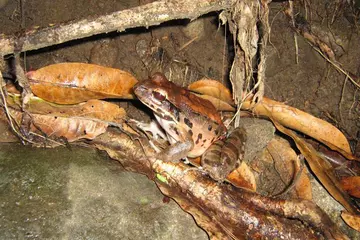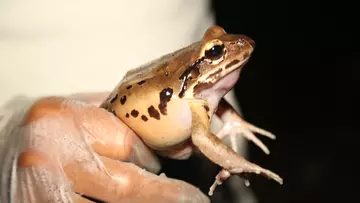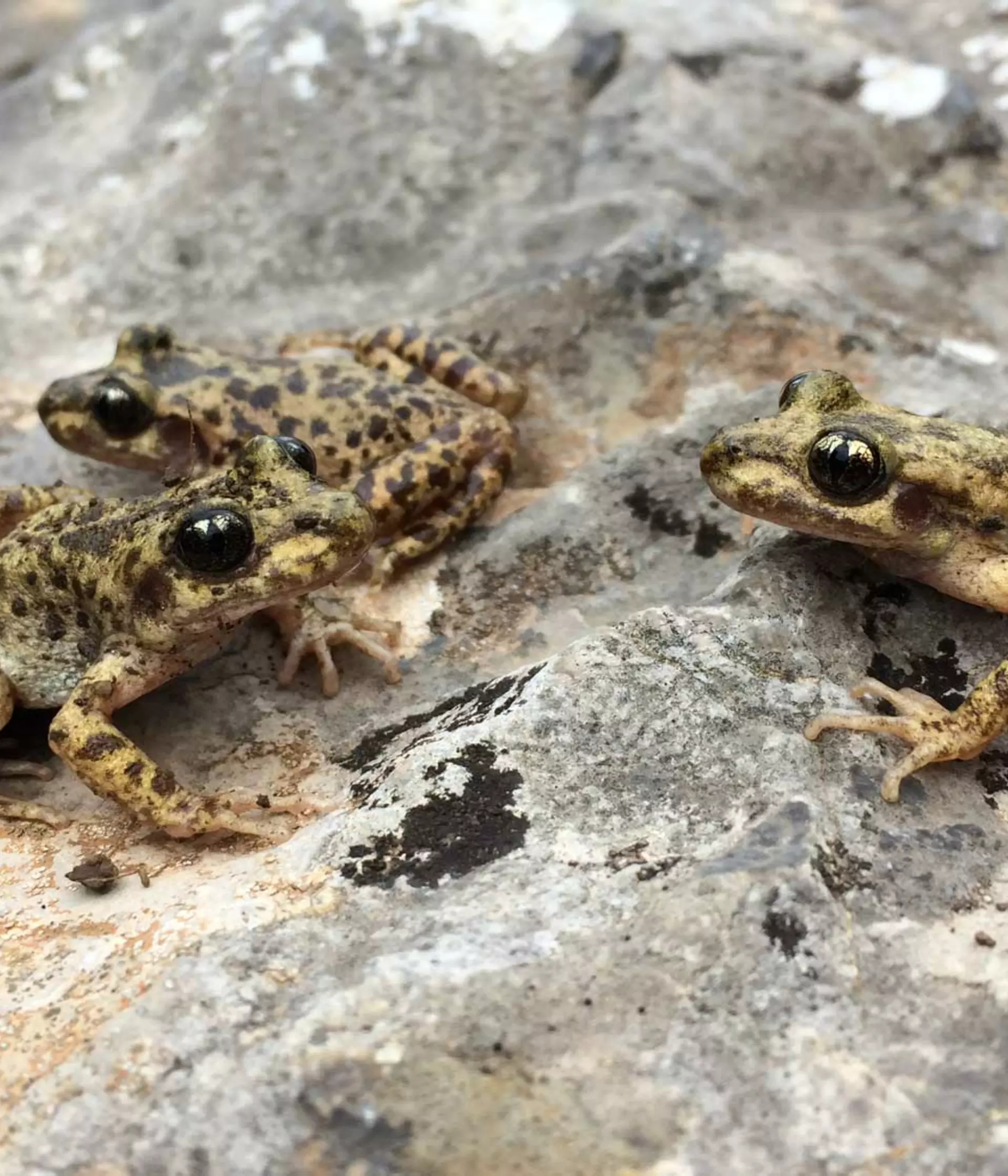Andrew Cunningham
Deputy Director of Science
Prof Trenton W J Garner
Professor at the Institute of Zoology
For more than 20 years, ZSL has been at the forefront of research on amphibian chytridiomycosis, a disease which has devastated amphibian populations globally.
Summary of the research
The global decline of amphibians is one of the most important biodiversity crises facing us today. Amphibian declines have many causes, but until the late 20th century infectious disease had not been identified as a factor. In the mid-1990s, however, an international team of scientists led by Professor Andrew Cunningham, a researcher from ZSL’s Institute of Zoology (IoZ), identified a novel infectious agent, Batrachochytrium dendrobatidis (Bd), a chytrid fungus that produces the amphibian disease chytridiomycosis, and demonstrated that this was a major cause of amphibian mortality and declines on at least two continents.
At this time, Prof. Cunningham was Chair of the Pathology & Disease Working Group of the IUCN’s Declining Amphibian Population Task Force, which enabled him to bring together amphibian decline researchers and pathologists across the world and which resulted in this discovery; an effort described as "an exemplary example of international scientific collaboration" (Nature 394, 418-419). Prof. Cunningham and the team were each awarded a medal by the CSIRO in Australia for this work.
Subsequently, IoZ’s scientists have spent close to two decades working on this disease, including collaborating with researchers from dozens of countries to understand the current status and underlying drivers of the distribution, spread and impacts of Bd. In particular, we have described infection and lethal impacts in dozens of amphibian species across Europe, the Caribbean, South America, Africa and Asia.

The ZSL amphibian working group
As the amphibian decline crisis deepened, a ZSL amphibian working group was established to bring staff together from across the organisation to maximise our efforts to combat amphibian declines through research, in-country conservation and capacity building and conservation breeding in ZSL London Zoo. Some of our zoo-bred animals, housed under biosecure conditions, have been released back into the wild with careful post-release monitoring to learn from successes and failures alike. In all these areas we work closely with other institutions, including universities, governments and other conservation non-governmental organisations.
Our work and other studies have shown that the mortality caused by chytridiomycosis can cause catastrophic and persistent amphibian population declines that may, in extreme cases, result in species extinctions. Collectively, this has identified environmental conditions and amphibian taxonomic groups that are at greater risk of disease emergence and decline due to chytridiomycosis. Using state-of-the-art genome sequencing technology, we have shown how the recent evolution of Bd produced a novel, hypervirulent and now globally-distributed form of the pathogen that is predominantly responsible for amphibian mortality and declines worldwide.
We continue to identify new variants of Bd using next-generation sequencing technologies and we are currently investigating how competition amongst genetic variants may be behind the evolution of hypervirulence. In addition, ZSL staff were involved in the recent discovery of a completely new species of chytrid fungus that is devastating fire salamander populations in Western Europe and we have been at the forefront of working with the British government to try to mitigate any impacts this new disease might have on amphibians in the UK.

We are constantly translating our world-class research on chytridiomycosis into conservation strategies that combat this threat to amphibians. IoZ scientists have shown how introduced and non-native species may commonly harbour infections and how movement of amphibians for trade and even conservation purposes can expand the range of Bd and other pathogens.
We work with national and international entities to develop strategies that our research indicates will reduce the risk of infection being spread by the amphibian trade and reduce the risk of spill-over from captive to wild populations. We are at the forefront of amphibian welfare, developing methods for treating infection in both captive and wild populations. Our latest work takes our welfare research into the wildlife conservation setting: we are the first to publish evidence that infection can be cleared from wild amphibian populations.
Find out how ZSL is working to protect mountain chicken frogs
Key Species
- Alytes muletensis, the Mallorcan midwife toad. IUCN Red List Vulnerable, EU Habitats Directive Annex ii priority species and Annex iv
- Alytes obstetricans, the common midwife toad. IUCN Red List Least Concern, EU Habitats Directive Annex iv
- Andrias davidianus, the Chinese giant salamander. IUCN Red List Critically Endangered
- Bufo bufo, the common toad. IUCN Red List Least Concern, protected against sale and transportation for the purpose of sale in the UK
- Euproctus platycephalus, the Sardinian brook newt. IUCN Red List Endangered, EU Habitats Directive Annex iv
- Leptodactylus fallax, the mountain chicken frog. IUCN Red List Critically Endangered
- Lissotriton helveticus, the palmate newt. IUCN Red List Least Concern, protected against sale and transportation for the purpose of sale in the UK
- Mesotriton alpestris, the alpine newt. IUCN Red List Least Concern
- Rana temporaria, the common frog. IUCN Red List Least Concern, protected against sale and transportation for the purpose of sale in the UK
- Rhinoderma darwinii, Southern Darwin’s frog. IUCN Red List Vulnerable.
- Rhinoderma rufum, Northern Darwin’s frog. IUCN Red List Critically Endangered (Possibly Extinct).
People involved
- Institute of Zoology staff: Professor Andrew Cunningham, Dr Trent Garner, Dr Mike Hudson, ZSL
- ZSL London Zoo staff: Ben Tapley, Dr. Christopher Michaels
Partners
- UK: Amphibian and Reptile Conservation Trust; Amphibian & Reptile Groups of the UK; British Trust for Ornithology; Froglife; Imperial College; Royal Society for the Protection of Birds; UCL; University of Kent (DICE); University of Cambridge
- Spain: Museo Nacional de Ciencias Naturales(CSIC).
- Italy: Zirichiltaggi S.W.C.
- Switzerland: KARCH; Universität Zürich
- France: Université de Montpellier
- Germany: Helmholtz-Centre for Environmental Research
- Belgium: Universiteit Gent
- South Africa: Northwest University
- Canada: Laurentian University; University of Victoria
- Dominica: Government of Dominica Forestry & Wildlife Division and Veterinary Division; Durrell Wildlife Conservation Trust; North of England Zoological Society
- Montserrat: Government of Montserrat’s Ministry of Agriculture, Trade, Housing, Lands and Environment; Durrell Wildlife Conservation Trust; North of England Zoological Society
- Chile: Universidad Andrés Bello; Ranita de Darwin
- China: Shaanxi Normal University; Kunming Institute of Zoology; Chengdu Institute of Biology; Guiyang University.
Sponsors
Amphibian and Reptile Conservation Trust; Animal & Plant Health Agency; BBSRC; Defra (including the Darwin Initiative); Durrell Wildlife Conservation Trust; the European Union; Morris Animal Foundation; Natural England; NERC; People’s Trust for Endangered Species; the Royal Society.
